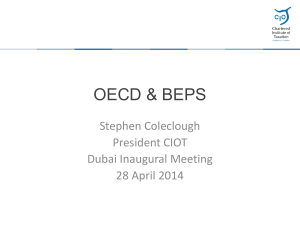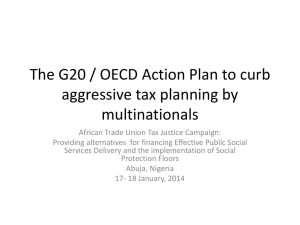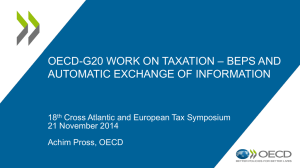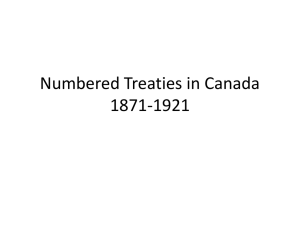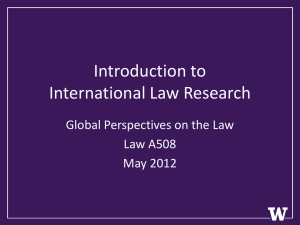Selected Issues from BEPS
advertisement
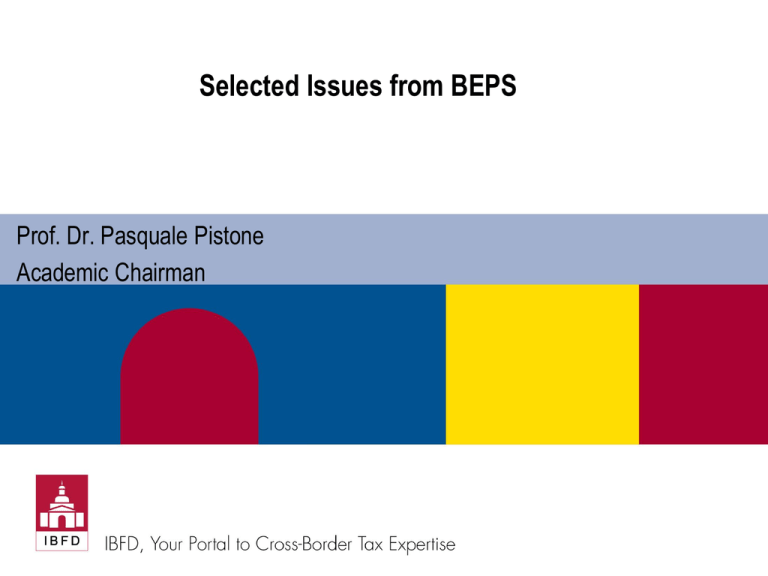
Selected Issues from BEPS Prof. Dr. Pasquale Pistone Academic Chairman Outline 1. From countering abuse to countering aggressive tax planning 2. Aggressive tax planning, double non-taxation and tax incentives 3. Countering double non-taxation vs. right to non-interference 4. Tax incentives to research and development 5. BEPS and developing countries 6. BEPS and the future of tax treaties Conclusions 1. Countering abuse in international tax matters • • • • Domestic and tax treaty clauses can be used to counter abusive practices Domestic law and treaties considerably vary as to substance and standards BEPS action 6 (draft presented on 14 March 2014 and action to be completed in September 2014) supports a two-tier action for the purpose of implementing a common approach that prevents use of tax treaties as vehicles for abusive tax practices: 1. GAAR based on the main purpose test to exclude entitlement to treaty benefits 2. SAARs, such as for instance the ones based on LoB US clauses – Despite option for derivative benefits, unclear if in line with European Union law Key issue: treaties are not meant to generate double non-taxation (Action item 6) – Clarification: countering tax avoidance and evasion is a purpose of tax treaties – Treaty shopping can now be more precisely countered, but how about cases in which there is no actual tax avoidance or evasion? And double non-taxation? – The unclear relations between tax avoidance, evasion and aggressive tax planning 1. Countering abuse in international tax matters 1. Domestic level: States are entitled to counter abuse practices and the fight against aggressive tax planning will preserve such right 2. Treaty level: Anti-abuse clauses in tax treaties lead to symmetrical results and thus can be included if both contracting State require so, in line with BEPS SPECIAL ISSUES FOR • Subject-to-tax clauses: admissible when targeted to tackle abusive arrangements aimed at zero-tax solutions, but interfere with the State’s non-fiscal policy goals • Switchover clauses: structurally incoherent, since they allow the State of residence to eliminate the effects of the different levels of taxation (without importing the losses, due to the exemption method). This leads to unfair structural advantages to the residence State 1. Countering aggressive tax planning: BEPS developments • • • • June 2013: Committee on Fiscal Affairs (CFA) created WP 11 WP11 continues the OECD’s work on Aggressive Tax Planning (ATP), responsible for delivering on a number of ATP-related items under the BEPS action plan: – Action 2 – Hybrid mismatch arrangements – Action 3 – Controlled foreign company (CFC) rules – Action 4 – Limitation on interest deductions and other financial payments – Action 12 – Mandatory disclosure Goal is to tackle tax arbitrage beyond countering tax avoidance, evasion and fraud Aggressive tax planning – exploitation of cross-border advantages resulting from disparities across tax systems: pushing international tax planning to the extreme – Double deductions – Deductions coupled with non-taxation – Artificial separation of taxation from income generating activities 2. Aggressive tax planning, double non-taxation and tax incentives • • • The success of aggressive tax planning strategies is frequently enhanced by the limited ability of the existing tax rules to allocate taxing powers in a way to reflect the new features of the digital economy Phenomena of international tax planning that require urgent action in order to preserve the effectiveness of taxing sovereignty: – Erosion of the permanent establishment – Income production without structure or presence in the State of source – International tax planning aimed at achieving double non-taxation What is the frontier between intended and unintended double non-taxation? – The answer between OECD countries can be different from that in relations with non-OECD and, more in general, relations involving developing countries – May States be still allowed to preserve the right to tax as implying also the right not to exercise their taxing jurisdiction? The BEPS answer is no, but…? 2. Aggressive tax planning, double non-taxation and tax incentives • • • • • • • • Taxation distorts economic choices Taxes are levied for fiscal and non-fiscal purposes The levying of taxes for non-fiscal purposes is an instrument to pursue policy goals Taxes with non-fiscal goals are often modelled for correcting distortions (Pigouvian taxes) Double non-taxation is the outcome of negative conflicts of sovereignty, but can arise intentionally and unintentionally Is double non-taxation always bad, or always an indicator of aggressive tax planning? MNEs pursue double non-taxation at cross-border level, also by channelling FDI through interposed companies => BEPS action 5 aims at countering such schemes However, if States keep right to pursue policy goals both in domestic and cross-border situations, they should be allowed to remain the masters of their own policy decisions 3. Countering double non-taxation vs. right to non-interference • • • • • • Tax treaties: how much the allocation of taxing powers allows a Contracting State to interfere with the policy decision of the other State – State of residence and the different relief methods Different theories: no interference just in the presence of notional credits for developing countries vs. the right to non-interference Different situations: channelling flows of income through low-tax jurisdictions should not be mixed up with the right of the source State to exercise its taxing sovereignty on income that is generated by an activity exercised on its territory A particularly delicate matter for developing countries, but also more in general This situation applies to ATP just as much as to abusive practices A more specific example: incentives to research and development 4. Tax incentives to research and development • • • • • • • • Promoting R&D is fundamental to secure competitiveness for developed countries R&D special tax regimes are very diffused in OECD countries When applicable in the form of output incentives (IP box regimes), their components are often designed in a very broad way, sometimes without an actual connection to a R&D activity carried out by the recipient of the benefit (also applicable to outsourcing) In such cases R&D incentives end up in being tools for aggressive tax planning that segregate the special regime from its rationale and allow for artificial shifting of income Special regimes are exceptions to the principle of equality, can constitute subsidies under WTO law and problems of compatibility with the EU prohibition of State aids But, to the extent that are consistently designed with their goal, they should be allowed BEPS should not entirely prevent the use of taxation for genuine non-fiscal purposes This is a particularly important issue for developing countries, also considering the limited legitimacy of BEPS in that area 5. BEPS and developing countries • How can the G20 political mandate and the standards set by the OECD hear the voice of developing countries? • Task force on tax and development created in 2010 with advisory capacity to OECD Committee on Fiscal Affairs – the 4 pillars 1. State building, accountability and effective capacity development • Tax incentives 2. More effective transfer pricing regimes 3. Increased transparency in MNEs reporting 4. Supporting fight against avoidance and evasion through fiscal transparency • The role of the United Nations, which participates to BEPS with status of observer • The role of BRICS • Formation of regional groups on tax and development in Africa and Latin America 5. BEPS and developing countries • • 1. 2. 3. 4. General issue of legitimacy as to whether BEPS can and/or should apply to developing countries even if such countries have not participated to issuing its standards Must developing countries have entirely different interests from developed countries? Both want to keep place alignment between income producing activity and the place where the tax is actually paid, otherwise substance of tax sovereignty is undermined Both share the aim of countering aggressive tax planning and are concerned with some practices, such as the artificial avoidance of PE status The thin (but existing) dividing line between double non-taxation and the right to remain the master of one’s international policy Further sources of concern: i. Issues related to fiscal transparency and exchange of information; ii. complexity of reconstructing transfer pricing in line with value creation; iii. more serious issues of protection of taxpayers’ rights 6. BEPS and the future of tax treaties • • • • • • Tax treaties will still play an important role in the future of international taxation However, their resemblance to the Model Convention is likely to increase as a consequence of the implementation of BEPS Formal bilateralism conveying substantive multilateralism be even more evident, to the extent that bilateral treaties will in fact have to comply with BEPS standards Global fiscal transparency will soon move towards formal and substantive multilateralism (Council of Europe-OECD multilateral treaty) Since tax treaty rules on allocation of taxing powers will more and more resemble, one may wonder whether it would not be possible to start carving out provisions from bilateral treaties and replacing them with multilateral ones Major changes to the existing bilateral tax treaties and their content will otherwise anyway be required 6. BEPS and the future of tax treaties • • • • Is a change to all existing treaties an impossible task? No, since their content should not truly be the object of renegotiation, but rather only of adaptation to BEPS standards. An option could be to sign a single international multilateral protocol, whose content should then be implemented in the bilateral treaties For the sake of ensuring an adequate monitoring of the consistency with BEPS, an advisory board function could be exercised by a group of countries under the supervision of the OECD and the UN, following a similar model to that which has successfully applied in the field of fiscal transparency Conclusions 1. 2. 3. 4. 5. BEPS will reduce the boundaries of legitimate international tax planning going far beyond the prohibition of abusive practices: cross-border consistent treatment, that aligns taxing powers with business substance within a transparent framework that combines certainty and predictability BEPS should strike down preferential tax regimes lacking a genuine rationale. Its implementation should not prevent taxes from being used for non-fiscal purposes BEPS cannot automatically apply to developing countries, but should adapt its value core to their different reality BEPS will reduce the right of States to exercise the substance of their tax sovereignty in a way that is totally disconnected from the BEPS standards Although Russia is not an OECD country and has right to pursue its tax sovereignty in line with its policy goals, it should not proactively be engaged in practices that depart from BEPS standards Thanks for your attention! p.pistone@ibfd.org


